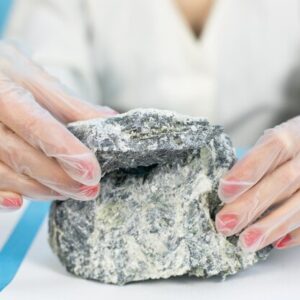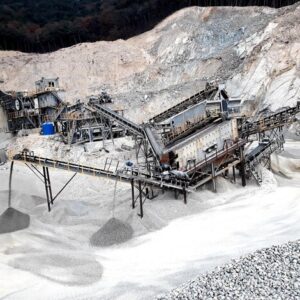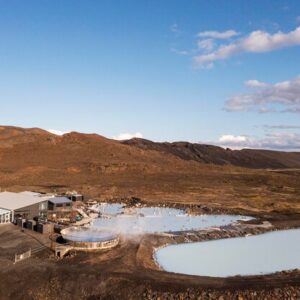Bentonite powder is a highly versatile and naturally occurring clay material, made primarily of the mineral montmorillonite. It is widely used in various industrial applications due to its unique physical properties such as swelling, absorption, and gel formation. Bentonite’s adaptability allows it to be used in diverse fields ranging from oil drilling to cosmetics and environmental management. Understanding the types of bentonite powder is crucial for selecting the right one for specific applications. In this comprehensive guide, we will explore the various types of bentonite, their characteristics, and how they are used across different industries.
1. What is Bentonite Powder?
Bentonite is a fine, soft, absorbent clay that forms when volcanic ash weathers and ages in the presence of water. It is composed mainly of montmorillonite, a mineral that can absorb large amounts of water, causing the clay to swell and form a gel-like consistency. Bentonite powder, when finely ground, retains these properties, making it useful in a wide range of applications.
The key characteristics of bentonite powder include:
- High Absorbency: Bentonite can absorb several times its weight in water, making it an effective material in various industries that require moisture retention or absorption.
- Swelling Ability: When hydrated, bentonite expands to many times its original volume, which is why it is often used as a sealing agent.
- Cation Exchange Capacity (CEC): Bentonite has the ability to exchange positively charged ions, which makes it useful for water purification, soil stabilization, and in pharmaceutical applications.
There are several different types of bentonite powder, each with its own specific properties and uses.
2. Types of Bentonite Powder
Bentonite can be categorized into three main types based on its composition, structure, and usage. These include:
- Sodium Bentonite
- Calcium Bentonite
- Potassium Bentonite
Each of these types has unique properties that make it suitable for specific applications. Let’s delve deeper into each type to understand its characteristics, benefits, and industrial uses.
2.1 Sodium Bentonite
Sodium bentonite is the most common and widely used type of bentonite. It is characterized by its high swelling properties and is most commonly found in natural deposits. Sodium bentonite has the ability to expand significantly when mixed with water, forming a gel-like substance that makes it highly effective for sealing applications, such as pond liners, landfills, and well construction.
Properties of Sodium Bentonite
- Swelling: Sodium bentonite swells up to 15 times its dry volume when hydrated, which allows it to form a highly impermeable barrier.
- Absorption: It has a high water absorption capacity, making it ideal for use in applications requiring moisture retention, such as drilling fluids and slurries.
- High Cation Exchange Capacity: This property is useful in soil stabilization and water treatment.
Applications of Sodium Bentonite
- Drilling Mud: In the oil and gas industry, sodium bentonite is widely used as a drilling fluid due to its ability to create thick, stable slurries. It helps to cool and lubricate the drill bit, remove cuttings from the borehole, and seal the walls of the well.
- Environmental Applications: Sodium bentonite is used for sealing landfills, ponds, and underground storage tanks, where its swelling property prevents fluid leakage. It is also employed in the construction of geothermal wells and in waste containment systems.
- Water Treatment: Due to its high absorption capacity, sodium bentonite is used in water purification processes. It can absorb heavy metals, chemicals, and organic compounds from contaminated water.
- Foundries: Sodium bentonite is used in foundries as a binding agent for sand molds. It helps to hold the sand together and provides the necessary strength for casting processes.
2.2 Calcium Bentonite
Calcium bentonite is another popular type of bentonite, known for its ability to remain relatively stable and less swollen when in contact with water. This type of bentonite contains more calcium ions than sodium ions and is typically used in applications where its non-swelling properties are required.
Properties of Calcium Bentonite
- Low Swelling: Calcium bentonite swells much less compared to sodium bentonite, which makes it more suitable for applications where swelling would be undesirable.
- Higher Density: This type of bentonite tends to have a denser structure than sodium bentonite, which makes it ideal for industrial applications where durability and strength are needed.
- Lower Cation Exchange Capacity: Calcium bentonite has a lower CEC than sodium bentonite, making it less effective in certain applications such as water purification but suitable for others.
Applications of Calcium Bentonite
- Construction and Civil Engineering: Calcium bentonite is used in the construction industry, particularly for soil stabilization. It helps improve the strength and load-bearing capacity of soils, especially in areas where the soil is loose or sandy.
- Cat Litter: Calcium bentonite is the primary material used in clumping cat litter due to its ability to form solid clumps when exposed to moisture. The low swelling nature of calcium bentonite allows it to absorb moisture without expanding excessively, which makes it ideal for this application.
- Petroleum and Lubricant Industry: Calcium bentonite is also used in the petroleum industry as an additive in lubricants and greases. It helps improve the consistency and performance of these products.
- Cosmetics and Pharmaceuticals: In the cosmetic industry, calcium bentonite is commonly used in facial masks, cleansers, and other skincare products. Its natural absorbent properties help remove impurities from the skin, while its mild consistency makes it suitable for sensitive skin.
2.3 Potassium Bentonite
Potassium bentonite is the least common of the three major types of bentonite, but it is still used in certain specialized applications. It is often found in volcanic ash deposits and has unique characteristics that differentiate it from sodium and calcium bentonite.
Properties of Potassium Bentonite
- Potassium-Rich Composition: Potassium bentonite contains a significant amount of potassium ions, which gives it different chemical properties compared to sodium and calcium bentonite.
- Minimal Swelling: Similar to calcium bentonite, potassium bentonite exhibits relatively low swelling properties. However, its potassium content allows it to maintain high fluidity and form a stable paste when mixed with water.
- Lower Absorption Capacity: Potassium bentonite has a lower absorption rate compared to sodium bentonite but can still be effective in certain applications that require mild absorption or stabilization.
Applications of Potassium Bentonite
- Fertilizer Additive: Due to its high potassium content, potassium bentonite is sometimes used as a soil amendment to improve the potassium content in the soil. Potassium is an essential nutrient for plant growth, and potassium bentonite helps to enhance soil fertility.
- Water Treatment: Potassium bentonite can be used in water filtration systems, particularly for its ability to help clarify water without the excessive swelling that can occur with sodium bentonite. It can remove impurities and particles from water without altering its composition too drastically.
- Pond Sealing: Potassium bentonite is sometimes used for sealing ponds and water bodies, particularly in cases where sodium bentonite may be too expansive. It provides a less invasive solution for water retention while maintaining environmental balance.
3. Other Special Forms of Bentonite Powder
In addition to the three main types of bentonite powder—sodium, calcium, and potassium—there are other specialized forms of bentonite that have been modified to meet specific industrial needs. These include:
3.1 Activated Bentonite
Activated bentonite is a form of bentonite that has been chemically treated to increase its absorbent capacity. By exposing the clay to certain chemicals, its surface area is increased, allowing it to absorb more moisture, oils, and impurities. Activated bentonite is commonly used in the purification of oils, fats, and other liquids in various industries.
3.2 Bentonite Clay (Modified)
Modified bentonite clay refers to bentonite that has been altered through chemical or mechanical processes to improve its properties. For example, certain modifications might enhance its dispersion ability, making it more effective as a thickening agent or emulsifier in products such as paints, cosmetics, and drilling fluids. Modified bentonite is often used in the production of personal care products, adhesives, and as an anti-caking agent in the food industry.
3.3 Bentonite for Pharmaceutical Use
Bentonite is also used in pharmaceutical applications, where it is typically purified and processed to be safe for consumption. In the pharmaceutical industry, bentonite is used as an excipient (inactive substance) in tablet production, where it helps bind ingredients together and enhance the flowability of the powders. It is also used in certain treatments for digestive disorders, where it can help remove toxins from the body.
5. Bentonite’s Role in the Oil and Gas Industry
One of the most significant and widespread uses of bentonite powder, especially sodium bentonite, is in the oil and gas industry, where it plays a critical role in drilling operations. Sodium bentonite, due to its ability to form thick slurries when mixed with water, is commonly used as a drilling fluid or “mud.” The primary function of bentonite-based drilling mud is to lubricate the drill bit, facilitate the removal of cuttings from the borehole, and maintain wellbore stability. Its swelling properties allow it to seal off permeable formations, preventing fluid loss during drilling.
In addition to its role as a drilling fluid, bentonite also helps to cool and clean the drilling equipment by carrying debris away from the drill site. Its ability to suspend solid particles while maintaining fluidity ensures smooth operations, reducing the risk of damage to the drilling apparatus. Bentonite’s role as a crucial component of drilling mud makes it an indispensable material for oil extraction, especially in regions where drilling is conducted in difficult terrains or at great depths.
Furthermore, bentonite is used in the construction of wells for both water and oil extraction. As a sealant, sodium bentonite prevents water from entering or leaving the well, ensuring the integrity of the well structure. Its ability to form an impermeable barrier is crucial in environmental protection, as it prevents contaminants from spreading into groundwater supplies. The use of bentonite in drilling and well construction thus plays a vital role in both the efficiency and environmental safety of the oil and gas industry.
6. Bentonite in Environmental Management and Remediation
Bentonite powder is widely recognized for its exceptional ability to manage and remediate environmental issues. One of the most important uses of bentonite in this regard is in the containment of hazardous waste. Due to its low permeability and excellent sealing capabilities, bentonite is often used in landfills, mining waste storage, and contaminated site remediation. Sodium bentonite is particularly effective in creating impermeable barriers that prevent the seepage of harmful chemicals and toxins into surrounding soil and groundwater.
In addition to waste containment, bentonite plays a role in water purification and soil remediation. The high adsorption capacity of bentonite allows it to trap heavy metals, oils, and organic pollutants, making it an ideal material for cleaning contaminated water. It is often used in treatment plants where its natural absorbent properties help remove impurities from wastewater. Similarly, bentonite is employed in soil stabilization and erosion control, improving the quality of soil in areas affected by pollution or excessive water runoff. Its role in improving water quality and controlling pollution is one of the most environmentally significant uses of bentonite.
Bentonite is also used in the stabilization of toxic or radioactive waste sites. When combined with other materials such as cement, bentonite can create a durable, long-lasting barrier that restricts the movement of harmful substances, providing long-term protection for the environment. The use of bentonite in environmental management highlights its potential to address growing concerns about pollution, waste containment, and the protection of water resources.
7. Bentonite in Agriculture
Bentonite powder is a valuable resource in the agricultural industry, where it serves a variety of purposes. One of the most significant applications is in soil conditioning. Bentonite helps improve the structure and fertility of soils by enhancing water retention and reducing soil erosion. Its swelling ability can also improve the aeration of compacted soils, making it easier for plant roots to grow and access nutrients. This makes bentonite an ideal addition to sandy soils, which often struggle with water retention.
In addition to soil conditioning, bentonite is used as a carrier for fertilizers, pesticides, and herbicides. The powdery clay can absorb and hold onto these chemicals, allowing them to be released slowly over time, ensuring that crops receive a steady supply of nutrients or pest control agents. This slow-release mechanism makes bentonite a valuable tool for sustainable farming practices, as it reduces the need for frequent reapplication of fertilizers and pesticides. Its use in this context also reduces the environmental impact of farming, as it minimizes chemical runoff into nearby water sources.
Bentonite’s role in agriculture extends to animal care as well. It is used as a feed additive to support the digestive health of livestock. Bentonite can help bind toxins and harmful substances in the animal’s digestive tract, aiding in detoxification and preventing the absorption of harmful compounds. It is especially effective in poultry, swine, and dairy farming, where it helps to improve overall animal health and productivity.
8. Bentonite in Cosmetics and Personal Care
Bentonite powder is an essential ingredient in many cosmetic and personal care products due to its skin-friendly properties. Its ability to absorb oils and impurities makes it an effective detoxifying agent in facial masks, cleansers, and scrubs. When applied to the skin, bentonite powder draws out excess oil, dirt, and toxins from the pores, leaving the skin feeling clean and refreshed. This makes it particularly popular in acne treatments and oil-control products.
Bentonite is also used in deodorants, hair care products, and even toothpaste due to its mild abrasive properties and ability to remove impurities. In hair care, it is used in shampoos and conditioners to cleanse the scalp and hair of excess oils, dirt, and styling products. It helps to restore the natural balance of oils in the scalp, making it beneficial for individuals with oily or combination skin. Additionally, in toothpaste, bentonite helps to gently scrub the teeth while also promoting oral health by removing plaque and bacteria.
Its non-toxic and gentle nature makes bentonite an ideal ingredient in personal care products for individuals with sensitive skin. The use of bentonite in cosmetics is growing as consumers seek natural, eco-friendly alternatives to synthetic chemicals, and it is often preferred for its safety and effectiveness in various beauty treatments.
9. Bentonite in the Food and Beverage Industry
Bentonite powder also finds applications in the food and beverage industry, where it is used as a clarifying agent and food additive. In wine production, for example, bentonite is used to clarify the liquid and remove proteins that might cause haziness. It is added to the wine as a slurry and, when mixed, binds to the proteins and other impurities, which are then removed by filtration. This helps produce clear, visually appealing beverages with enhanced stability.
In the food industry, bentonite is also used as an anti-caking agent in powdered foods such as spices, salt, and flour. It helps to prevent the clumping of powders by absorbing moisture, ensuring that the products remain free-flowing and easy to use. Bentonite is generally considered safe for consumption and is approved by food safety authorities for use in food processing.
Additionally, bentonite is used in the production of edible oils, where it helps remove impurities from the oil, improving its quality and extending shelf life. Its adsorption properties are harnessed in the filtration process to remove unwanted materials, such as suspended particles, that could affect the flavor or appearance of the oil. The versatility of bentonite in the food and beverage industry makes it an essential component of many processing applications.
Conclusion
Bentonite powder is an incredibly versatile material with a wide range of industrial applications, and its various types each have distinct properties that make them suited for different uses. Sodium bentonite is highly effective in drilling and environmental applications due to its strong swelling and absorbent properties. Calcium bentonite is prized in construction, cosmetics, and pet care due to its durability and non-swelling nature. Potassium bentonite, though less common, is used for its unique chemical properties, especially in agriculture and water treatment.






